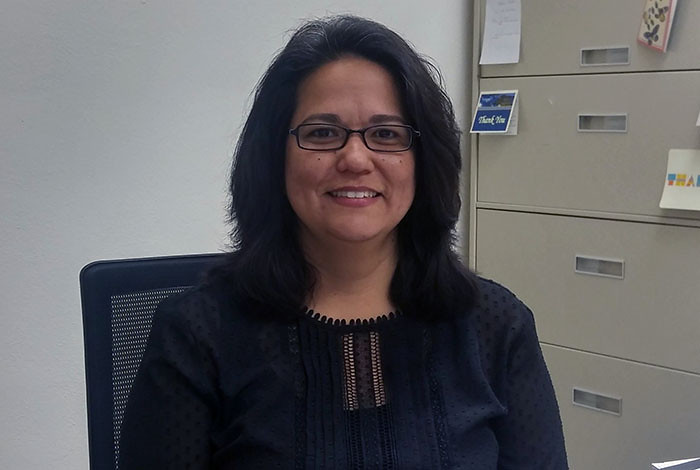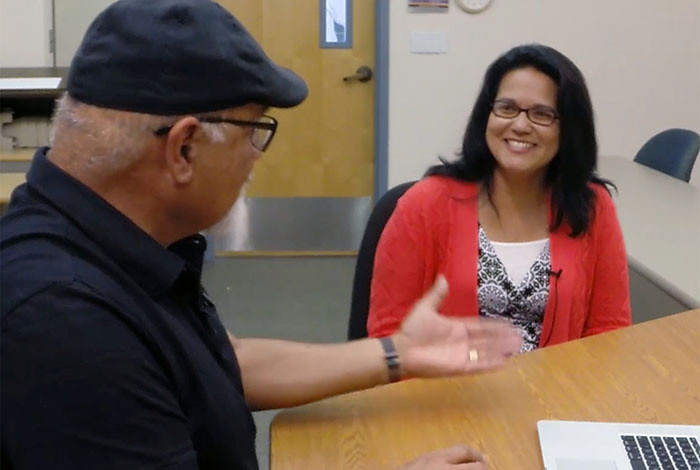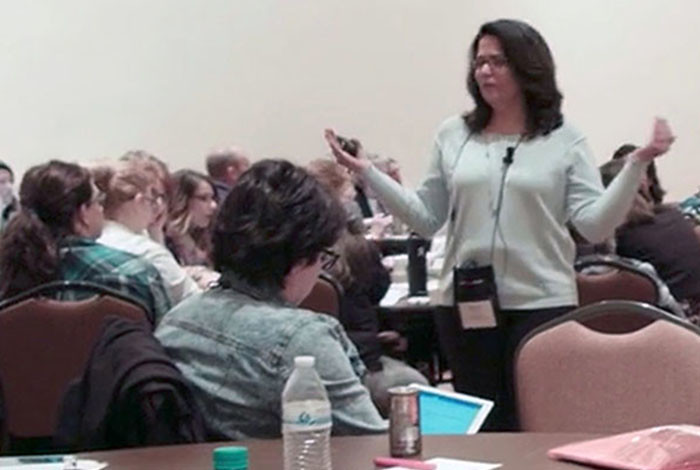An educator’s success story

Once an elementary school teacher in Española, Yanira Vasquez is now Director of the Math and Science Bureau of the Public Education Department.
During her professional career, Yanira Vasquez has transitioned—via the Laboratory’s Math and Science Academy (MSA)—from Española grade school teacher to Director of the Math and Science Bureau of the Public Education Department.
MSA is a professional development program for K–12 teachers. For three years, participants attend a three-week summer course during which they study best practices in math and science education. Teachers also receive instructional support and additional math and science content workshops throughout the school year. The program aims to increase teachers’ content knowledge and their use of research-based practices for lessons in the classroom, as well as to improve their leadership skills.
By implementing skills she’s learned from the MSA, Vasquez helps teachers and schools improve their math and science programs. For example, the math program that the MSA encouraged the Española public schools to adopt changed the teaching model and subsequently changed the students’ test results.
“Educational research claims you won’t see a change in student achievement for three years,” Vasquez says. “But in Española, because of the intensive support we were providing, scores went up the first year and every year after that.”
Connecting with MSA
Vasquez, Puerto Rican by birth, grew up in Massachusetts and moved to New Mexico in 2001. She was teaching first grade and later fifth grade at Eutimio “Tim” Salazar III Fairview Elementary in Española when her principal signed her up for the MSA teacher training program in 2003.
“That was the beginning of my life with MSA,” Vasquez says. “I was able to bring my four-month-old baby (to the training). Had they not made that allowance, I probably wouldn’t have attempted the program.”
In her third year of the program, Vasquez started a master’s degree in math and science education from New Mexico State University as part of a new partnership with MSA. “I was a working teacher and a mom of small kids at the time, so it was difficult for me to commute to class,” she notes. “The partnership allowed me take online courses and made the degree accessible.”
Vasquez became a math coach, a science coach, and an instructional coach at her elementary school. She supported countless teachers as the district adopted the new math program that involved more collaboration and discussion. “Teachers functioned more as guides than as the main focus in the room,” she adds. “It was a shift to let students take more control of the learning.”

MSA’s Lorenzo Gonzales interviews Vasquez about her MSA experiences.
Moving on up
Jumping at the next opportunity for professional development, Vasquez joined a cohort of teachers pursuing doctoral degrees in education leadership with a focus on rural math education through an MSA partnership with the University of New Mexico in 2010.
She decided to earn an administrative license as part of her doctorate—separate from the degree coursework—and in 2013 she was hired as the principal at Tony E. Quintana Sombrillo Elementary in Española.
The next step up the ladder for Vasquez took her to the State’s Public Education Department in Santa Fe as the Math Specialist, and as of January 2017, she became the Director of the Math and Science Bureau.
“A huge part of my job is to plan, design, and implement professional development for math and science teachers, and to determine where to use our funds,” she explains. “I support teachers and administrators with questions about math and science standards, teaching and learning, and what classes should be offered.”
Vasquez also designed and manages a pilot partnership between PED and MSA called Pathway to Math Excellence (PME) that supports school districts develop math coaches. This summer she’ll finish her dissertation, which focuses on PME coaches and the challenges they face as both teachers and administrators.
“The MSA’s influence can be seen in everything I’ve done,” Vasquez says. “It opened doors in ways I couldn’t have on my own, and it allowed me to think about education beyond the classroom and in terms of the district, the state, and the nation.”

Vasquez presents at the national MidSchool Math conference.






